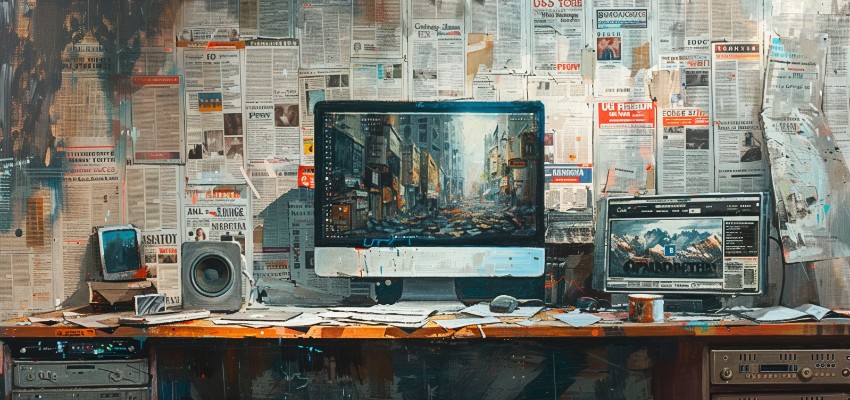The ongoing battle between generative artificial intelligence (Gen AI) companies and news organizations over the use of copyrighted material has reached the courtroom, with significant implications for journalism and AI development. The central issue is whether Gen AI developers can use copyrighted news articles to train their language models under the doctrine of fair use or if they must compensate news organizations for their content. This dispute has given rise to a series of lawsuits and negotiations that are reshaping the relationship between these two industries.
In April, eight newspaper companies filed a lawsuit against Microsoft and OpenAI, alleging that their copyrighted articles were used without permission to train AI models. This follows similar legal actions from The New York Times Company in December against the same defendants. The core of these complaints is that Gen AI companies have been “purloining millions of the Publishers’ copyrighted articles without permission and without payment,” as stated by the plaintiffs. The litigation efforts are supported by the News/Media Alliance (N/MA), a non-profit organization that emphasizes the critical role of journalism in democratic societies and the need to protect high-quality journalistic content.
On the other side of the debate, OpenAI and Microsoft argue that their use of copyrighted material falls under fair use, a concept in copyright law that allows for the use of copyrighted work without permission under certain conditions. OpenAI contends that their AI tools transform the copyrighted data into new, original creations, thus qualifying as transformative use. “Using publicly available information to extract uncopyrightable ideas and facts about language and the world to create a large language model that powers transformative generative artificial intelligence is a quintessential fair use,” OpenAI stated in its motion to dismiss the lawsuit filed by The New York Times.
Licensing agreements between AI companies and news organizations offer an alternative to litigation and legislation. Companies such as News Corp, which owns The Wall Street Journal and The New York Post, have struck deals with OpenAI, providing access to their content in exchange for financial compensation. This path of private dealmaking has been encouraged by the N/MA, which views licensing as a feasible solution for balancing the needs of both content creators and technology innovators.
However, this approach has created a significant split within the journalism community. While some news organizations like News Corp and Vox Media are partnering with AI companies to secure additional revenue through licensing deals, others, including The New York Times and publications owned by Alden Global Capital, continue to pursue legal action against the unauthorized use of their content. This division highlights the contrasting strategies within the industry on how to handle the challenges posed by Gen AI.
The stakes are high for both sides. For news organizations, the primary concern is the preservation of their ability to generate revenue from their work and maintain the integrity of journalistic content. Without proper compensation, the economic foundation of journalism is threatened, which could undermine the press’s watchdog role in society. “The unlawful use of The Times’ work to create artificial intelligence products that compete with it threatens The Times’ ability to supply trustworthy information, news analysis, and commentary,” the New York Times Company asserted in its lawsuit.
Conversely, AI companies argue that limiting their access to data could hinder the development of more advanced and accurate AI models. Generative AI relies on vast amounts of data to function effectively, and access to high-quality, reliable information is crucial for improving the accuracy of AI-generated content. OpenAI’s partnerships with media companies aim to address these needs while attempting to ensure fair compensation to the content creators.
This debate is further complicated by the actions of other tech giants, such as Alphabet and Meta, which have also been seeking licensing agreements with media companies. These corporations aim to use vast catalogs of digital content to train their respective AI models, raising additional ethical questions about the impact on creative industries. Reports indicate that companies like Disney, Netflix, and Warner Brothers have been approached for such deals, though not all have agreed to contribute their content directly.
The legal disputes and strategic decisions of news organizations and AI companies are being closely watched, as their outcomes will have far-reaching implications for both sectors. The tension between maintaining intellectual property rights and fostering technological innovation is at the heart of this issue, demanding a delicate balance that respects the contributions of journalists while allowing the advancement of AI technologies.
News Sources
- Legislation, Litigation, or Licensing? Resolving Journalists’ Copyright Concerns About Training Generative AI Tools
- The Changing Times
- More major news corporations are selling out to AI
- OpenAI signs deals with Vox, the Atlantic to put news into ChatGPT
- HaystackID® Global Advisory
Assisted by GAI and LLM Technologies
SOURCE: HaystackID




